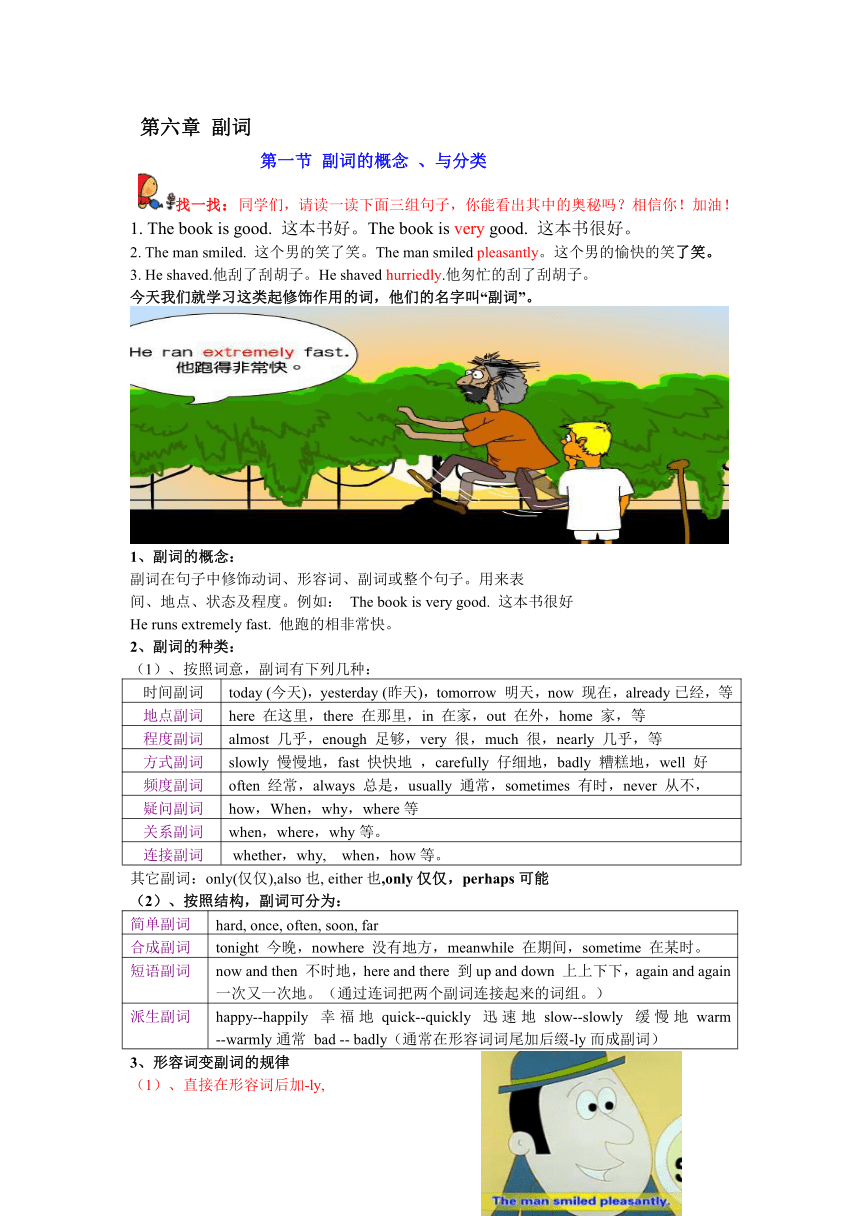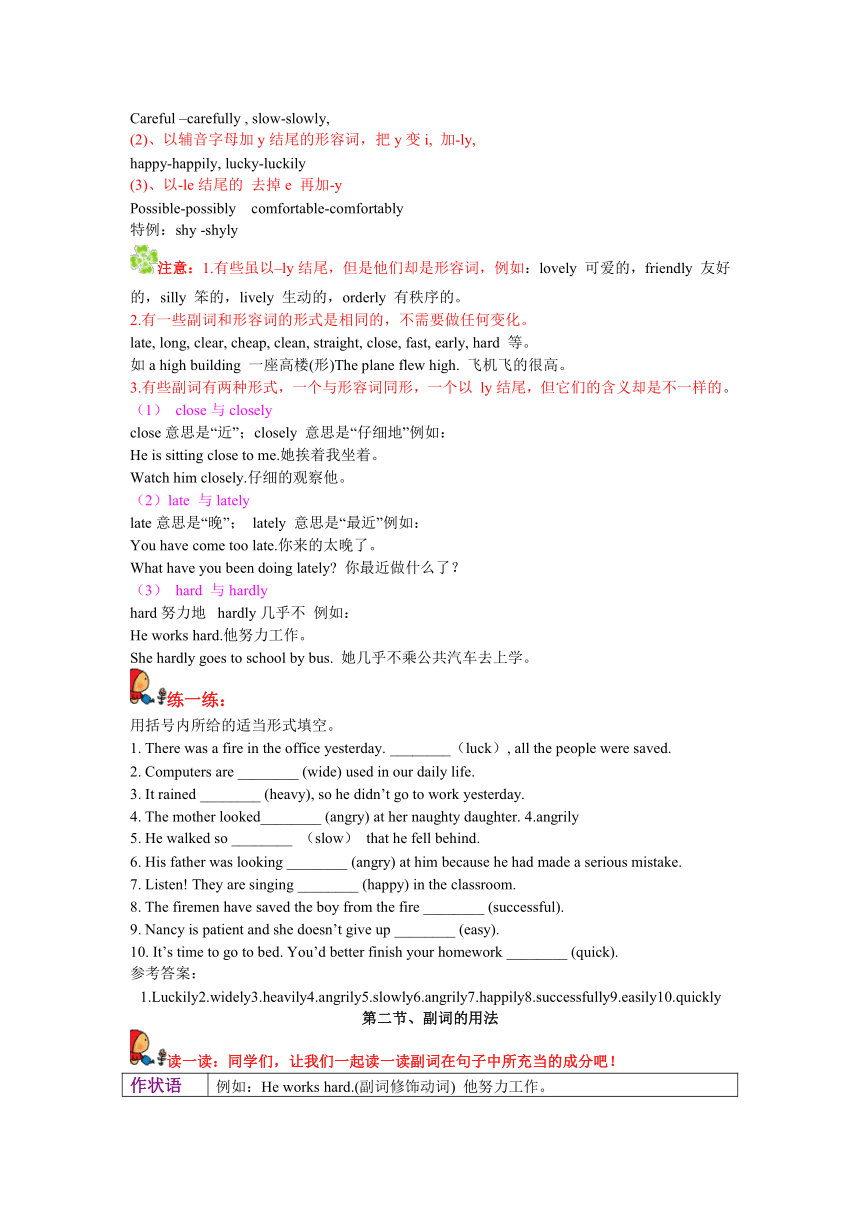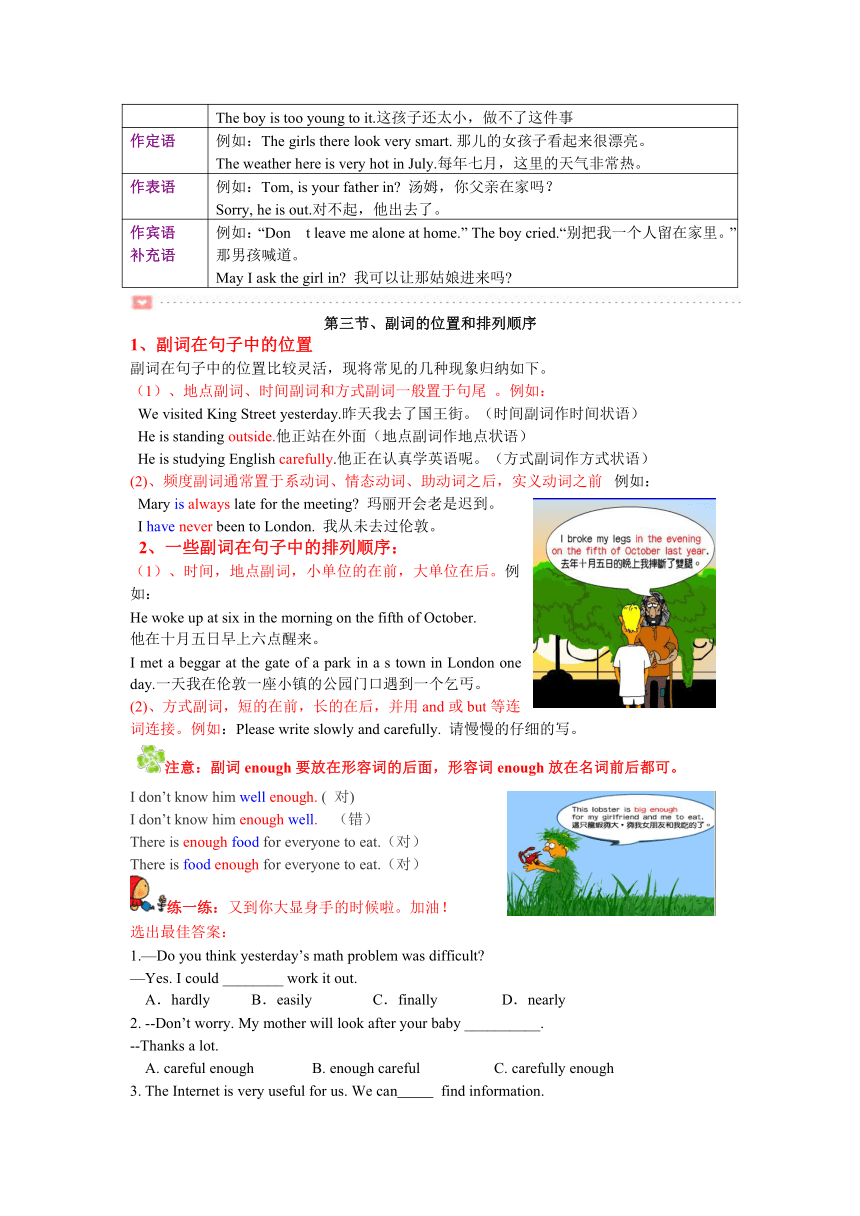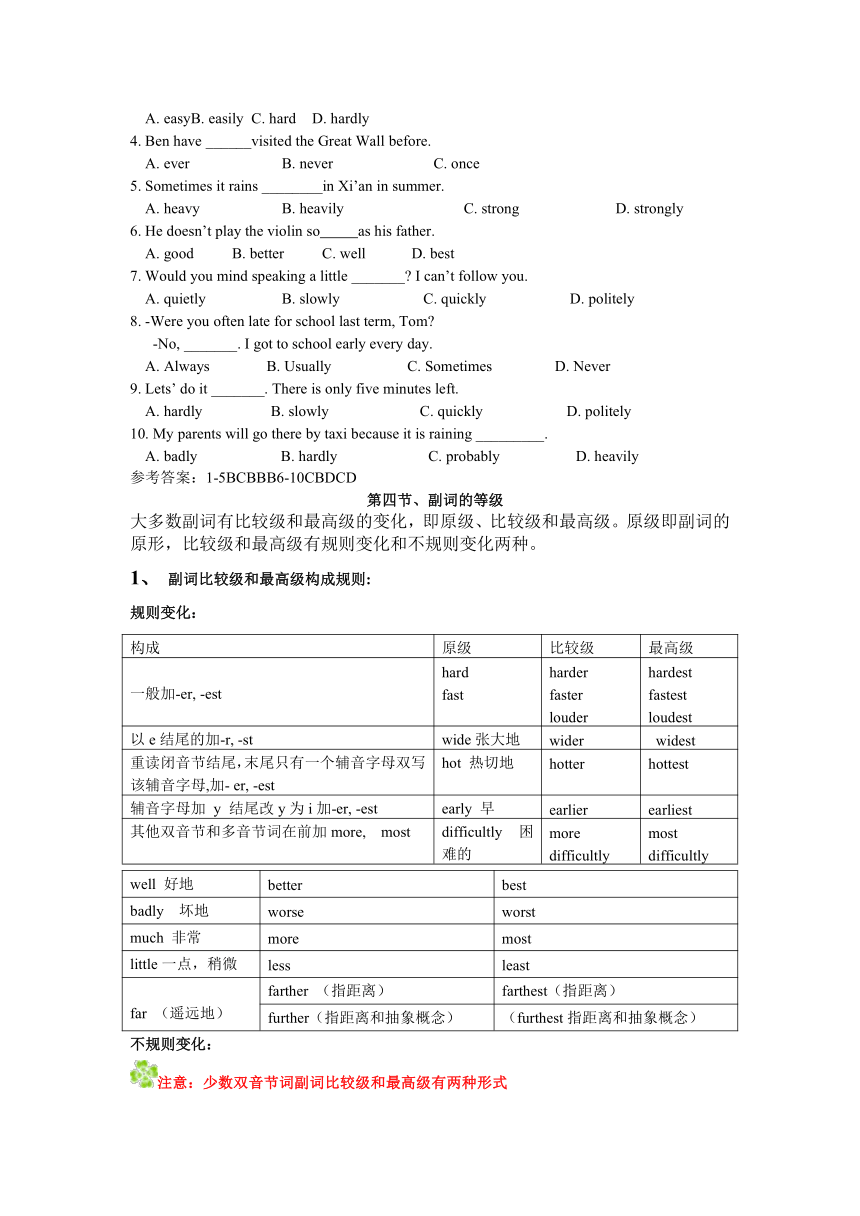初中英语语法复习:副词(含练习和答案)
文档属性
| 名称 | 初中英语语法复习:副词(含练习和答案) |  | |
| 格式 | zip | ||
| 文件大小 | 195.6KB | ||
| 资源类型 | 教案 | ||
| 版本资源 | 通用版 | ||
| 科目 | 英语 | ||
| 更新时间 | 2013-04-17 08:08:11 | ||
图片预览




文档简介
第六章 副词
副词的概念 、与分类
找一找:同学们,请读一读下面三组句子,你能看出其中的奥秘吗?相信你!加油!
1. The book is good. 这本书好。The book is very good. 这本书很好。
2. The man smiled. 这个男的笑了笑。The man smiled pleasantly。这个男的愉快的笑了笑。
3. He shaved.他刮了刮胡子。He shaved hurriedly.他匆忙的刮了刮胡子。
今天我们就学习这类起修饰作用的词,他们的名字叫“副词”。
1、副词的概念:
副词在句子中修饰动词、形容词、副词或整个句子。用来表
间、地点、状态及程度。例如: The book is very good. 这本书很好
He runs extremely fast. 他跑的相非常快。
2、副词的种类:
(1)、按照词意,副词有下列几种:
时间副词
today (今天),yesterday (昨天),tomorrow 明天,now 现在,already已经,等
地点副词
here 在这里,there 在那里,in 在家,out 在外,home 家,等
程度副词
almost 几乎,enough 足够,very 很,much 很,nearly 几乎,等
方式副词
slowly 慢慢地,fast 快快地 ,carefully 仔细地,badly 糟糕地,well 好
频度副词
often 经常,always 总是,usually 通常,sometimes 有时,never 从不,
疑问副词
how,When,why,where等
关系副词
when,where,why等。
连接副词
?whether,why, when,how等。
其它副词:only(仅仅),also也, either也,only仅仅,perhaps可能 (2)、按照结构,副词可分为:
简单副词
hard, once, often, soon, far
合成副词
tonight 今晚,nowhere 没有地方,meanwhile 在期间,sometime 在某时。
短语副词
now and then 不时地,here and there 到up and down 上上下下,again and again 一次又一次地。(通过连词把两个副词连接起来的词组。)
派生副词
happy--happily 幸福地quick--quickly 迅速地slow--slowly 缓慢地warm --warmly通常 bad -- badly(通常在形容词词尾加后缀-ly而成副词)
3、形容词变副词的规律
(1)、直接在形容词后加-ly,
Careful –carefully , slow-slowly,
(2)、以辅音字母加y结尾的形容词,把y变i, 加-ly,
happy-happily, lucky-luckily
(3)、以-le结尾的 去掉e 再加-y
Possible-possibly comfortable-comfortably
特例:shy -shyly
注意:1.有些虽以–ly结尾,但是他们却是形容词,例如:lovely 可爱的,friendly 友好的,silly 笨的,lively 生动的,orderly 有秩序的。 2.有一些副词和形容词的形式是相同的,不需要做任何变化。
late, long, clear, cheap, clean, straight, close, fast, early, hard 等。 如a high building 一座高楼(形)The plane flew high. 飞机飞的很高。
3.有些副词有两种形式,一个与形容词同形,一个以 ly结尾,但它们的含义却是不一样的。
(1) close与closely
close意思是“近”;closely 意思是“仔细地”例如:
He is sitting close to me.她挨着我坐着。
Watch him closely.仔细的观察他。
(2)late 与lately
late意思是“晚”; lately 意思是“最近”例如:
You have come too late.你来的太晚了。
What have you been doing lately? 你最近做什么了?
(3) hard 与hardly
hard努力地? hardly几乎不 例如:
He works hard.他努力工作。
She hardly goes to school by bus. 她几乎不乘公共汽车去上学。
练一练:
用括号内所给的适当形式填空。
1. There was a fire in the office yesterday. ________(luck), all the people were saved.
2. Computers are ________ (wide) used in our daily life.
3. It rained ________ (heavy), so he didn’t go to work yesterday.
4. The mother looked________ (angry) at her naughty daughter. 4.angrily
5. He walked so ________ (slow) that he fell behind.
6. His father was looking ________ (angry) at him because he had made a serious mistake.
7. Listen! They are singing ________ (happy) in the classroom.
8. The firemen have saved the boy from the fire ________ (successful).
9. Nancy is patient and she doesn’t give up ________ (easy).
10. It’s time to go to bed. You’d better finish your homework ________ (quick).
参考答案:
1.Luckily2.widely3.heavily4.angrily5.slowly6.angrily7.happily8.successfully9.easily10.quickly 第二节、副词的用法
读一读:同学们,让我们一起读一读副词在句子中所充当的成分吧!
作状语
例如:He works hard.(副词修饰动词) 他努力工作。
The boy is too young to it.这孩子还太小,做不了这件事
作定语
例如:The girls there look very?smart.?那儿的女孩子看起来很漂亮。
The weather here is very hot in July.每年七月,这里的天气非常热。
作表语
例如:Tom, is your father in? 汤姆,你父亲在家吗?
Sorry, he is out.对不起,他出去了。
作宾语
补充语
例如:“Don?t leave me alone at home.” The boy cried.“别把我一个人留在家里。”那男孩喊道。 May I ask the girl in? 我可以让那姑娘进来吗?
第三节、副词的位置和排列顺序
1、副词在句子中的位置
副词在句子中的位置比较灵活,现将常见的几种现象归纳如下。
(1)、地点副词、时间副词和方式副词一般置于句尾 。例如: We visited King Street yesterday.昨天我去了国王街。(时间副词作时间状语) He is standing outside.他正站在外面(地点副词作地点状语)
He is studying English carefully.他正在认真学英语呢。(方式副词作方式状语)
(2)、频度副词通常置于系动词、情态动词、助动词之后,实义动词之前? 例如:
Mary is always late for the meeting? 玛丽开会老是迟到。
I have never been to London. 我从未去过伦敦。??
2、一些副词在句子中的排列顺序:
(1)、时间,地点副词,小单位的在前,大单位在后。例如:
He woke up at six in the morning on the fifth of October.
他在十月五日早上六点醒来。
I met a beggar at the gate of a park in a s town in London one day.一天我在伦敦一座小镇的公园门口遇到一个乞丐。
(2)、方式副词,短的在前,长的在后,并用and或but等连词连接。例如:Please write slowly and carefully. 请慢慢的仔细的写。
注意:副词enough要放在形容词的后面,形容词enough放在名词前后都可。 I don’t know him well enough. ( 对)
I don’t know him enough well. (错)
There is enough food for everyone to eat.(对) There is food enough for everyone to eat.(对)
练一练:又到你大显身手的时候啦。加油!
选出最佳答案:
1.—Do you think yesterday’s math problem was difficult?
—Yes. I could ________ work it out.
A.hardly B.easily C.finally D.nearly
2. --Don’t worry. My mother will look after your baby __________.
--Thanks a lot.
A. careful enough B. enough careful C. carefully enough
3. The Internet is very useful for us. We can find information.
A. easy B. easily C. hard D. hardly
4. Ben have ______visited the Great Wall before.
A. ever B. never C. once
5. Sometimes it rains ________in Xi’an in summer.
A. heavy B. heavily C. strong D. strongly
6. He doesn’t play the violin so as his father.
A. good B. better C. well D. best
7. Would you mind speaking a little _______? I can’t follow you.
A. quietly B. slowly C. quickly D. politely
8. -Were you often late for school last term, Tom?
-No, _______. I got to school early every day.
A. Always B. Usually C. Sometimes D. Never
9. Lets’ do it _______. There is only five minutes left.
A. hardly B. slowly C. quickly D. politely
10. My parents will go there by taxi because it is raining _________.
A. badly B. hardly C. probably D. heavily
参考答案:1-5BCBBB6-10CBDCD
第四节、副词的等级
大多数副词有比较级和最高级的变化,即原级、比较级和最高级。原级即副词的原形,比较级和最高级有规则变化和不规则变化两种。
1、 副词比较级和最高级构成规则:
规则变化:
构成
原级
比较级
最高级
一般加-er, -est
hard
fast
harder
faster
louder
hardest
fastest
loudest
以e结尾的加-r, -st
wide张大地
wider
widest
重读闭音节结尾,末尾只有一个辅音字母双写该辅音字母,加- er, -est
hot 热切地
hotter
hottest
辅音字母加 y 结尾改y为i加-er, -est
early 早
earlier
earliest
其他双音节和多音节词在前加more, most
difficultly困难的
more difficultly
most difficultly
不规则变化:
well 好地
better
best
badly 坏地
worse
worst
much 非常
more
most
little一点,稍微
less
least
far (遥远地)
farther (指距离)
farthest(指距离)
further(指距离和抽象概念)
(furthest指距离和抽象概念)
注意:少数双音节词副词比较级和最高级有两种形式
0ften-more often (oftener)-most often (oftenest)
练一练:学的怎么样?做一做吧!加油哦!
写出下列副词的比较级与最高级形式:
1、hard _____ ______ 2、quickly ______ _______
3、slowly ______ _______ 4、brightly______ _____
5、happily____ _____
6、well________ __________
7、often____ _____ 8、 bad_____ __________
9、much_____ _______ 10、hot_____ ________
答案:1. harder hardest 2. more quickly most quickly 3.more slowly most slowly 4.more brightly most brightly 5. more happily; most happily 6. better best 7. more often (oftener)-most often (oftenest)8. worse worst 9.more most 10. hotter hottest
学一学:继续加油哦,接下来让我们来学习比较级和最高级的用法和句型吧!
副词比较级的用法和形容词比较级的用法几乎是一样的。
2、副词比较级用法
(1)、主 + 谓语+比较级+than + 其他
I run faster than he (does)
我跑地比他快。
Lily does her homework more carefully than Mary does.
莉莉做作业比玛丽认真。
Li Hui usually gets to the classroom earlier than the others.
刘慧通常比其它人进教室早。
(2)、主语+谓语+比较级+ and +比较级+其他
The days are gettng longer and longer in summer.
夏天白天变得越来越长。
(3)、the + 比较级 … the + 比较级,越来越 。。。
The harder you work, the better you will learn..
你工作越努力,你学的会越多
3、副词最高级的用法:
(1)、最高级主要用“the + 副词最高级+ 表示范围的短语或从句”的结构表示。定冠词最高级前的the可以省略。 I get up (the) earliest in my family.
我在家里起得最早
Tom runs (the fastest) in his school.汤姆在学校里跑得最快
Bob speaks English better than Dan, but Tom speaks (the) best of the three.
鲍勃英语说得比丹好,但是汤姆在三个人里面说得最好.
4、副词原级比较的主要用法
(1)、A+谓语+ as+原级+as + B 表示A与B一样…。例如:
He jumps as tall as I. 他跳的和我一样高。
(2)、A + 谓语+ not as +原级+ as B 表示A不如B….例如:
He jumps not as high as I.他没有我跳的高。
=He jumps lower than I. 他比我跳的低。
=I jumps higher than he.我比他跳的高。
5、用来修饰比较级的词
much,a lot,far,little,a bit等
例如: This train runs much faster than that one. 这辆火车比那辆跑地快。
练一练:
选择填空
Which does Jimmy like ________ , Chinese or Art?
A. well B. best C. better D. much
2.Tom speaks Chinese____better than Jimmy.
A. more B. very C. a lot of D. much
3. Who has _______apples now, Jim, Lily or Lucy?
A. much B. biggest C. better D. the most
4. He speaks English ___ his aunt. A. as good as B. as well as C. as better as D. as best as
5. Who sings___, Rose or Kate? A. well B. good C. better D. best
6. Tom does his homework _______ Lucy.
A. as carefully as B. so careful as C. as careful as D. so carefully as
7.You must drive _______ next time, or there may be another accident.
A. more carefully B. carefully C. careful D. more careful
8. 2.—What do you think of Zhou Jielun?
—Oh, he is my favorite singer. I think no one can sing ______.
A. good B. well C. better D. best
9. I’m sure you can jump as __________ as Tom if you wear your sports shoes.
A. high B. highly C. higher D. highest
10. I can type _________ than I can write by hand.
A. fast B. more faster C. much faster D. fastest 参考答案:1-5.CDBBC 6-10 AACAC
第四节 几种常见副词的用法区别
1、very与much表示“很”,“非常”
very用于修饰形容词或副词的原级;much用于修饰形容词或副词的比较级,修饰动词要用much或very much. 例如:
She said she was much better than before. 她说她比过去好多了。
I like English very much. 我非常喜欢英语。
2、 too, also与either表示“也(不)”。
too和 also用于肯定句,too多用于口语,用于句尾。also多用于书面语,用于主语后,动词。either用于否定句句尾。例如:
You like playing football.我喜欢踢足球。
Lucy like playing football, too. 露西也喜欢踢足球。
Sam also like playing football.萨姆也喜欢踢足球。
You don’t like playing football,and I don’t like playing basketball either.
我不喜欢踢足球,并且我也不喜欢打篮球。
how often, how long 和 how soon 这三个都是针对时间提问的疑问词组,但所提问的意义不同。 (1)、how often
强调频率,即每隔多少时间进行一次,
答话经常是 once a week, twice a month, every other day, every two days 等。 --How often should I take this medicine? --这种药我应该多长时间吃一次? --Every four hours--每隔四小时服一次。 (2)、how soon
是指还要多长时间才能发生某一动作或达到某种状态,通常用于一般将来时回答经常用 in 组成的表示将来时间的介词短语。如:in two hours, in a few days 等。 --How soon will the summer vocation be? --In a month. --还有多长时间放暑假? --还有一个月。 (3)、how long
是强调某一动作或状态持续多长时间,通常用于完成时或持续性动词的一般时 。通常回答是 for a long time, for two hours 等。 --How long have you been in America? --你在美国呆了多久? --For two years. --两年。
3、 already, yet, still
already表示某事物已经发生,主要用于肯定句;yet表示期待某事发生,主要用于否定句和疑问句;still表示某事还在进行,主要用于肯定句和疑问句,有时也可用于否定句。如:
We've already watched that film.电影已经开始了。
I haven't finished my homework yet. 我作业还没做完
He still works until late every night.昨天晚上他写作业到很晚。
4、ago与before
ago用于一般过去时,与表示一段时间的词或短语连用。例如: He came back an hour ago. 他是一小时以前回来的。(不能用 before) before用于完成时,与表示点的时间连用。例如: They had already had their supper before I came back home. 他们在我回到家以前已经吃完晚饭了。 5、much too 与 too much (1)、much too 用于修饰形容词或副词,强调“实在……”或“太……”的语气。 The soup is much too salty! 这汤太咸了。 (2)、too much 用于修饰不可数名词,其本身也可以作代词或副词使用。 You drink too much! 你喝酒喝得太多! 练一练:考考你的时候到啦。相信你,加油哦!
选择正确的副词填入空格
1. already, yet, still
He hasn’t received any invitation ___.
I have finished reading the book _____。
They are ____ working in the field.
2. ago, before
Tom told his mother that he saw a sheep in the street three days ___.
Ten minutes ___,he came to help me.
either, too
You like playing video games. I like playing video games, ___.
He doesn't want any pears, I don't want any pears, ___.
4. How far, How long
(1) ___is it from your home to the cinema?
(2) ___does it take you to get to the school?
5. How often, How soon
(1) -___ does she come here ?
-In two hours.
(2) -___ does he go to the park ?
- Once a week .
参考答案:1. yet, already, still 2. ago, before 3. either, too 4. How far, How long5. How soon , How often,
副词的概念 、与分类
找一找:同学们,请读一读下面三组句子,你能看出其中的奥秘吗?相信你!加油!
1. The book is good. 这本书好。The book is very good. 这本书很好。
2. The man smiled. 这个男的笑了笑。The man smiled pleasantly。这个男的愉快的笑了笑。
3. He shaved.他刮了刮胡子。He shaved hurriedly.他匆忙的刮了刮胡子。
今天我们就学习这类起修饰作用的词,他们的名字叫“副词”。
1、副词的概念:
副词在句子中修饰动词、形容词、副词或整个句子。用来表
间、地点、状态及程度。例如: The book is very good. 这本书很好
He runs extremely fast. 他跑的相非常快。
2、副词的种类:
(1)、按照词意,副词有下列几种:
时间副词
today (今天),yesterday (昨天),tomorrow 明天,now 现在,already已经,等
地点副词
here 在这里,there 在那里,in 在家,out 在外,home 家,等
程度副词
almost 几乎,enough 足够,very 很,much 很,nearly 几乎,等
方式副词
slowly 慢慢地,fast 快快地 ,carefully 仔细地,badly 糟糕地,well 好
频度副词
often 经常,always 总是,usually 通常,sometimes 有时,never 从不,
疑问副词
how,When,why,where等
关系副词
when,where,why等。
连接副词
?whether,why, when,how等。
其它副词:only(仅仅),also也, either也,only仅仅,perhaps可能 (2)、按照结构,副词可分为:
简单副词
hard, once, often, soon, far
合成副词
tonight 今晚,nowhere 没有地方,meanwhile 在期间,sometime 在某时。
短语副词
now and then 不时地,here and there 到up and down 上上下下,again and again 一次又一次地。(通过连词把两个副词连接起来的词组。)
派生副词
happy--happily 幸福地quick--quickly 迅速地slow--slowly 缓慢地warm --warmly通常 bad -- badly(通常在形容词词尾加后缀-ly而成副词)
3、形容词变副词的规律
(1)、直接在形容词后加-ly,
Careful –carefully , slow-slowly,
(2)、以辅音字母加y结尾的形容词,把y变i, 加-ly,
happy-happily, lucky-luckily
(3)、以-le结尾的 去掉e 再加-y
Possible-possibly comfortable-comfortably
特例:shy -shyly
注意:1.有些虽以–ly结尾,但是他们却是形容词,例如:lovely 可爱的,friendly 友好的,silly 笨的,lively 生动的,orderly 有秩序的。 2.有一些副词和形容词的形式是相同的,不需要做任何变化。
late, long, clear, cheap, clean, straight, close, fast, early, hard 等。 如a high building 一座高楼(形)The plane flew high. 飞机飞的很高。
3.有些副词有两种形式,一个与形容词同形,一个以 ly结尾,但它们的含义却是不一样的。
(1) close与closely
close意思是“近”;closely 意思是“仔细地”例如:
He is sitting close to me.她挨着我坐着。
Watch him closely.仔细的观察他。
(2)late 与lately
late意思是“晚”; lately 意思是“最近”例如:
You have come too late.你来的太晚了。
What have you been doing lately? 你最近做什么了?
(3) hard 与hardly
hard努力地? hardly几乎不 例如:
He works hard.他努力工作。
She hardly goes to school by bus. 她几乎不乘公共汽车去上学。
练一练:
用括号内所给的适当形式填空。
1. There was a fire in the office yesterday. ________(luck), all the people were saved.
2. Computers are ________ (wide) used in our daily life.
3. It rained ________ (heavy), so he didn’t go to work yesterday.
4. The mother looked________ (angry) at her naughty daughter. 4.angrily
5. He walked so ________ (slow) that he fell behind.
6. His father was looking ________ (angry) at him because he had made a serious mistake.
7. Listen! They are singing ________ (happy) in the classroom.
8. The firemen have saved the boy from the fire ________ (successful).
9. Nancy is patient and she doesn’t give up ________ (easy).
10. It’s time to go to bed. You’d better finish your homework ________ (quick).
参考答案:
1.Luckily2.widely3.heavily4.angrily5.slowly6.angrily7.happily8.successfully9.easily10.quickly 第二节、副词的用法
读一读:同学们,让我们一起读一读副词在句子中所充当的成分吧!
作状语
例如:He works hard.(副词修饰动词) 他努力工作。
The boy is too young to it.这孩子还太小,做不了这件事
作定语
例如:The girls there look very?smart.?那儿的女孩子看起来很漂亮。
The weather here is very hot in July.每年七月,这里的天气非常热。
作表语
例如:Tom, is your father in? 汤姆,你父亲在家吗?
Sorry, he is out.对不起,他出去了。
作宾语
补充语
例如:“Don?t leave me alone at home.” The boy cried.“别把我一个人留在家里。”那男孩喊道。 May I ask the girl in? 我可以让那姑娘进来吗?
第三节、副词的位置和排列顺序
1、副词在句子中的位置
副词在句子中的位置比较灵活,现将常见的几种现象归纳如下。
(1)、地点副词、时间副词和方式副词一般置于句尾 。例如: We visited King Street yesterday.昨天我去了国王街。(时间副词作时间状语) He is standing outside.他正站在外面(地点副词作地点状语)
He is studying English carefully.他正在认真学英语呢。(方式副词作方式状语)
(2)、频度副词通常置于系动词、情态动词、助动词之后,实义动词之前? 例如:
Mary is always late for the meeting? 玛丽开会老是迟到。
I have never been to London. 我从未去过伦敦。??
2、一些副词在句子中的排列顺序:
(1)、时间,地点副词,小单位的在前,大单位在后。例如:
He woke up at six in the morning on the fifth of October.
他在十月五日早上六点醒来。
I met a beggar at the gate of a park in a s town in London one day.一天我在伦敦一座小镇的公园门口遇到一个乞丐。
(2)、方式副词,短的在前,长的在后,并用and或but等连词连接。例如:Please write slowly and carefully. 请慢慢的仔细的写。
注意:副词enough要放在形容词的后面,形容词enough放在名词前后都可。 I don’t know him well enough. ( 对)
I don’t know him enough well. (错)
There is enough food for everyone to eat.(对) There is food enough for everyone to eat.(对)
练一练:又到你大显身手的时候啦。加油!
选出最佳答案:
1.—Do you think yesterday’s math problem was difficult?
—Yes. I could ________ work it out.
A.hardly B.easily C.finally D.nearly
2. --Don’t worry. My mother will look after your baby __________.
--Thanks a lot.
A. careful enough B. enough careful C. carefully enough
3. The Internet is very useful for us. We can find information.
A. easy B. easily C. hard D. hardly
4. Ben have ______visited the Great Wall before.
A. ever B. never C. once
5. Sometimes it rains ________in Xi’an in summer.
A. heavy B. heavily C. strong D. strongly
6. He doesn’t play the violin so as his father.
A. good B. better C. well D. best
7. Would you mind speaking a little _______? I can’t follow you.
A. quietly B. slowly C. quickly D. politely
8. -Were you often late for school last term, Tom?
-No, _______. I got to school early every day.
A. Always B. Usually C. Sometimes D. Never
9. Lets’ do it _______. There is only five minutes left.
A. hardly B. slowly C. quickly D. politely
10. My parents will go there by taxi because it is raining _________.
A. badly B. hardly C. probably D. heavily
参考答案:1-5BCBBB6-10CBDCD
第四节、副词的等级
大多数副词有比较级和最高级的变化,即原级、比较级和最高级。原级即副词的原形,比较级和最高级有规则变化和不规则变化两种。
1、 副词比较级和最高级构成规则:
规则变化:
构成
原级
比较级
最高级
一般加-er, -est
hard
fast
harder
faster
louder
hardest
fastest
loudest
以e结尾的加-r, -st
wide张大地
wider
widest
重读闭音节结尾,末尾只有一个辅音字母双写该辅音字母,加- er, -est
hot 热切地
hotter
hottest
辅音字母加 y 结尾改y为i加-er, -est
early 早
earlier
earliest
其他双音节和多音节词在前加more, most
difficultly困难的
more difficultly
most difficultly
不规则变化:
well 好地
better
best
badly 坏地
worse
worst
much 非常
more
most
little一点,稍微
less
least
far (遥远地)
farther (指距离)
farthest(指距离)
further(指距离和抽象概念)
(furthest指距离和抽象概念)
注意:少数双音节词副词比较级和最高级有两种形式
0ften-more often (oftener)-most often (oftenest)
练一练:学的怎么样?做一做吧!加油哦!
写出下列副词的比较级与最高级形式:
1、hard _____ ______ 2、quickly ______ _______
3、slowly ______ _______ 4、brightly______ _____
5、happily____ _____
6、well________ __________
7、often____ _____ 8、 bad_____ __________
9、much_____ _______ 10、hot_____ ________
答案:1. harder hardest 2. more quickly most quickly 3.more slowly most slowly 4.more brightly most brightly 5. more happily; most happily 6. better best 7. more often (oftener)-most often (oftenest)8. worse worst 9.more most 10. hotter hottest
学一学:继续加油哦,接下来让我们来学习比较级和最高级的用法和句型吧!
副词比较级的用法和形容词比较级的用法几乎是一样的。
2、副词比较级用法
(1)、主 + 谓语+比较级+than + 其他
I run faster than he (does)
我跑地比他快。
Lily does her homework more carefully than Mary does.
莉莉做作业比玛丽认真。
Li Hui usually gets to the classroom earlier than the others.
刘慧通常比其它人进教室早。
(2)、主语+谓语+比较级+ and +比较级+其他
The days are gettng longer and longer in summer.
夏天白天变得越来越长。
(3)、the + 比较级 … the + 比较级,越来越 。。。
The harder you work, the better you will learn..
你工作越努力,你学的会越多
3、副词最高级的用法:
(1)、最高级主要用“the + 副词最高级+ 表示范围的短语或从句”的结构表示。定冠词最高级前的the可以省略。 I get up (the) earliest in my family.
我在家里起得最早
Tom runs (the fastest) in his school.汤姆在学校里跑得最快
Bob speaks English better than Dan, but Tom speaks (the) best of the three.
鲍勃英语说得比丹好,但是汤姆在三个人里面说得最好.
4、副词原级比较的主要用法
(1)、A+谓语+ as+原级+as + B 表示A与B一样…。例如:
He jumps as tall as I. 他跳的和我一样高。
(2)、A + 谓语+ not as +原级+ as B 表示A不如B….例如:
He jumps not as high as I.他没有我跳的高。
=He jumps lower than I. 他比我跳的低。
=I jumps higher than he.我比他跳的高。
5、用来修饰比较级的词
much,a lot,far,little,a bit等
例如: This train runs much faster than that one. 这辆火车比那辆跑地快。
练一练:
选择填空
Which does Jimmy like ________ , Chinese or Art?
A. well B. best C. better D. much
2.Tom speaks Chinese____better than Jimmy.
A. more B. very C. a lot of D. much
3. Who has _______apples now, Jim, Lily or Lucy?
A. much B. biggest C. better D. the most
4. He speaks English ___ his aunt. A. as good as B. as well as C. as better as D. as best as
5. Who sings___, Rose or Kate? A. well B. good C. better D. best
6. Tom does his homework _______ Lucy.
A. as carefully as B. so careful as C. as careful as D. so carefully as
7.You must drive _______ next time, or there may be another accident.
A. more carefully B. carefully C. careful D. more careful
8. 2.—What do you think of Zhou Jielun?
—Oh, he is my favorite singer. I think no one can sing ______.
A. good B. well C. better D. best
9. I’m sure you can jump as __________ as Tom if you wear your sports shoes.
A. high B. highly C. higher D. highest
10. I can type _________ than I can write by hand.
A. fast B. more faster C. much faster D. fastest 参考答案:1-5.CDBBC 6-10 AACAC
第四节 几种常见副词的用法区别
1、very与much表示“很”,“非常”
very用于修饰形容词或副词的原级;much用于修饰形容词或副词的比较级,修饰动词要用much或very much. 例如:
She said she was much better than before. 她说她比过去好多了。
I like English very much. 我非常喜欢英语。
2、 too, also与either表示“也(不)”。
too和 also用于肯定句,too多用于口语,用于句尾。also多用于书面语,用于主语后,动词。either用于否定句句尾。例如:
You like playing football.我喜欢踢足球。
Lucy like playing football, too. 露西也喜欢踢足球。
Sam also like playing football.萨姆也喜欢踢足球。
You don’t like playing football,and I don’t like playing basketball either.
我不喜欢踢足球,并且我也不喜欢打篮球。
how often, how long 和 how soon 这三个都是针对时间提问的疑问词组,但所提问的意义不同。 (1)、how often
强调频率,即每隔多少时间进行一次,
答话经常是 once a week, twice a month, every other day, every two days 等。 --How often should I take this medicine? --这种药我应该多长时间吃一次? --Every four hours--每隔四小时服一次。 (2)、how soon
是指还要多长时间才能发生某一动作或达到某种状态,通常用于一般将来时回答经常用 in 组成的表示将来时间的介词短语。如:in two hours, in a few days 等。 --How soon will the summer vocation be? --In a month. --还有多长时间放暑假? --还有一个月。 (3)、how long
是强调某一动作或状态持续多长时间,通常用于完成时或持续性动词的一般时 。通常回答是 for a long time, for two hours 等。 --How long have you been in America? --你在美国呆了多久? --For two years. --两年。
3、 already, yet, still
already表示某事物已经发生,主要用于肯定句;yet表示期待某事发生,主要用于否定句和疑问句;still表示某事还在进行,主要用于肯定句和疑问句,有时也可用于否定句。如:
We've already watched that film.电影已经开始了。
I haven't finished my homework yet. 我作业还没做完
He still works until late every night.昨天晚上他写作业到很晚。
4、ago与before
ago用于一般过去时,与表示一段时间的词或短语连用。例如: He came back an hour ago. 他是一小时以前回来的。(不能用 before) before用于完成时,与表示点的时间连用。例如: They had already had their supper before I came back home. 他们在我回到家以前已经吃完晚饭了。 5、much too 与 too much (1)、much too 用于修饰形容词或副词,强调“实在……”或“太……”的语气。 The soup is much too salty! 这汤太咸了。 (2)、too much 用于修饰不可数名词,其本身也可以作代词或副词使用。 You drink too much! 你喝酒喝得太多! 练一练:考考你的时候到啦。相信你,加油哦!
选择正确的副词填入空格
1. already, yet, still
He hasn’t received any invitation ___.
I have finished reading the book _____。
They are ____ working in the field.
2. ago, before
Tom told his mother that he saw a sheep in the street three days ___.
Ten minutes ___,he came to help me.
either, too
You like playing video games. I like playing video games, ___.
He doesn't want any pears, I don't want any pears, ___.
4. How far, How long
(1) ___is it from your home to the cinema?
(2) ___does it take you to get to the school?
5. How often, How soon
(1) -___ does she come here ?
-In two hours.
(2) -___ does he go to the park ?
- Once a week .
参考答案:1. yet, already, still 2. ago, before 3. either, too 4. How far, How long5. How soon , How often,
同课章节目录
- 词法
- 名词
- 动词和动词短语
- 动词语态
- 动词时态
- 助动词和情态动词
- 非谓语动词
- 冠词
- 代词
- 数词和量词
- 形容词副词及其比较等级
- 介词和介词短语
- 连词和感叹词
- 构词法
- 相似、相近词比较
- 句法
- 陈述句
- 一般疑问句和否定疑问句
- 特殊疑问句及选择疑问句
- 反意疑问句
- 存在句(There be句型)
- 宾语从句
- 定语从句
- 状语从句
- 主谓一致问题
- 简单句
- 并列句
- 复合句
- 主谓一致
- 主、表语从句
- 名词性从句
- 直接引语和间接引语
- 虚拟语气
- 感叹句
- 强调句
- 倒装句
- 祈使句
- 句子的成分
- 句子的分类
- 题型专区
- 单项选择部分
- 易错题
- 完形填空
- 阅读理解
- 词汇练习
- 听说训练
- 句型转换
- 补全对话
- 短文改错
- 翻译
- 书面表达
- 任务型阅读
- 语法填空
- 其他资料
